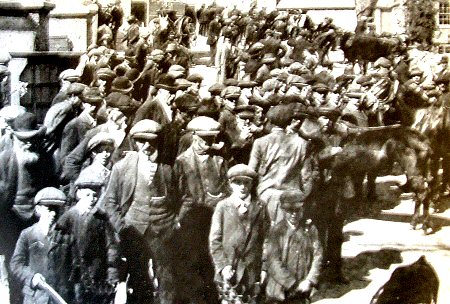Bridget was born on 11 February 1898 and grew up in the scenic townland of Ballintemple – making her a contemporary of your editor’s aunt Elizabeth who, though nine years junior, was her neighbour …
… living with the Rices within sight of the famous Ballymacdermott Court Cairn. Both young girls left the area forever before the young age of sixteen.
Bridget was the eldest child and only daughter of Annie and Michael of Ballintemple. Her brothers were Owenie, Mickey, Danny and Pat. Ballintemple is on the south-east rim of the Ring of Gullion and their home was about six miles from the town of
It was a humble abode consisting of two bedrooms and a living room/kitchen and had neither electricity nor running water. Water for drinking and cooking was carried in buckets from a nearby spring well, and water for washing came from a small river flowing down the mountain. It was perfectly clean. The family had three small fields of about ten acres and they raised one cow, a couple of calves, a pig, a goat and a few hens and ducks. These had their own out-housing.
It wasn’t possible for Michael to raise his growing family on the products of this small farm so, like so many of his neighbours and Irishmen across the country, he migrated to
As Bridget was the eldest she would have been taught to help out with household chores. From an early age she could milk the cow and the goat, feed the hens, collect eggs, clean out the byre, gather twigs to light the fire, fetch and carry water and complete numerous other jobs that were necessary, winter and summer.
In those days there were no buses or cars and when Annie wanted to go to Newry for essentials such as soap and tea, she walked the six miles. Bridget was left to look after her brothers until her mother returned. As there was no man in the home, all children had to help out as best they were able.
One source of income was blackberry-picking in the autumn. They grew in great abundance in the hedgerows all around and young children’s nimble fingers were suited to the task. A man called round once a week with a horse and cart, the latter bearing a great wooden barrel that held the fruit. The picked crop was weighed and the children were paid per stone (Imperial measure). The blackberries went to make jam or dyes.
In those days children were allowed a week off school in autumn to help with the potato harvest. All the children attended the local
Then suddenly Bridget was brought to Newry by her mother to the Hiring Fair!
As well as the regular market and fair days, there was in the town of Newry then, twice-yearly – spring and autumn – a Hiring Fair, where farmers, having completed their animal and produce sales, and made their other purchases for the home and farm, would walk up to Market Square where young people gathered with their parents for ‘hiring’.
The buzz of the busy town may have been exciting. There were all sorts of stalls set up everywhere, footpaths and road alike, for there was very little traffic in those days. You could buy almost anything – clothes, footwear, pots and pans, bed clothes, delph, food etc. at these stalls. Farmers’ wives brought their own butter and eggs for sale. It must have brought anxiety and trepidation to the young men and girls – children really – waiting to be hired out to strangers for six months labour.
Farmers would walk along the line boldly, sizing up the potential workers. It was exclusively a buyer’s market. The youth was hired for six months and wasn’t paid until the time was up. You had to stay or you got no money.
Bridget was hired for six months to a farmer from Banbridge at the rate of six pounds for the whole contract. The farmer called William John also rehired the boy he had had for the previous six months. He must have been pleased with his work.
Bridget said goodbye to her mother and set off in William John’s horse and cart to his farm which was five miles outside of the town. She had probably never been away from home before but she was to spend a half a year some twenty-three miles from her home place. The boy and William John walked, driving some animals they had bought that day and Bridget in the horse and cart had to follow. The horse probably knew the way home anyway!
Nothing was thought wrong about Bridget going off like that with a stranger. In any case she was fortunate. Willie John was a decent man and had a young family himself. Some were of an age with Bridget so he would hopefully look after Bridget as one of his own.
When they arrived at the farm house Willie John’s young family were sitting around the fire playing a game, already bathed and ready for bed. He had eight girls and two boys. Their names were Hannah, Jinnie, Dinah, Minnie, Lily, Agnes, Amy, Jessie, Robert and William John, named after his father.
It was Saturday night and the family were great church-goers so the children would be attending Sunday School the next day. Bridget sat down alongside the children to join in their game. The farmer’s wife gave a yell out of her!
‘Come and give me a hand to get this supper on the table!
We didn’t bring you here to play with children!’
It was the first Saturday in 1911.
Bridget was twelve.
She would not be thirteen until the month of February!
